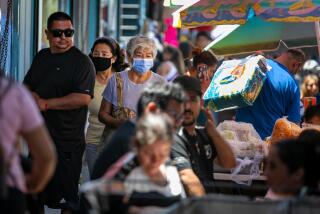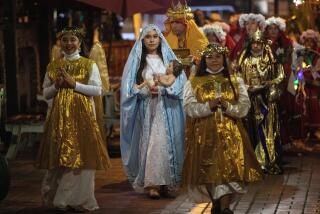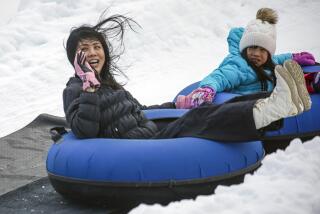The creep of coronavirus is changing daily lives, inspiring panic and shrugs
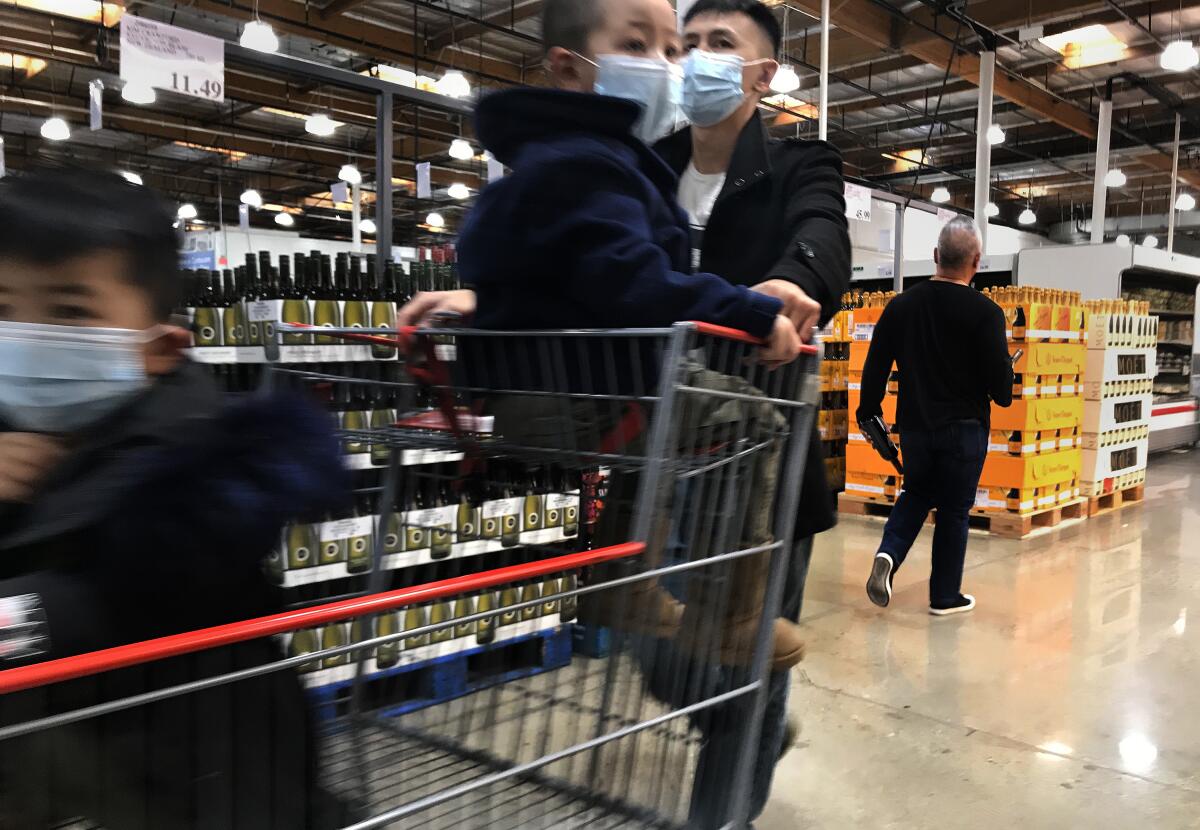
- Share via
Shopping carts snaked in a line so long it stretched into the Costco parking lot. It was early Saturday at the Atwater Village location and hundreds of customers, in varying states of concern, were counting down the seconds until the doors opened.
“Good morning, folks,” an employee shouted, “we have a limit on paper towels, water and bath tissue!”
As the crowd crushed toward the back of the store, piling their carts high with toilet paper and paper towels, employees stood in the aisles directing carts as if they were traffic controllers.
When he saw the long lines, Matthew Nasser wondered, at first, if there was a celebrity in the store. But then he asked someone what was going on. The commotion, he learned, was about the very thing that had nagged in the back of his mind: coronavirus. It wasn’t why he’d come shopping, but still, he decided to buy water and toilet paper.
“While it’s here,” he said, “I’d better get it.”
After weeks of watching its spread — in Italy and Iran, Seattle and South Korea — the anxiety of a global threat started to settle in across Southern California, creating a strange amalgam of emotions.
Some people carried on with their Saturday routines, entirely unfazed, and others — gym rats, mall shoppers, park lovers — became disturbingly aware of just how often they came into close contact with others.
At a Target in Mid-City, the shelves of bleach were completely emptied. And at a Sephora in Glendale, Mojo Tuheen perused the aisles of the cosmetic store, taking advantage of the smaller-than-usual crowds. She wasn’t going to put any makeup samples on her face — but that’s not something she usually does anyway.
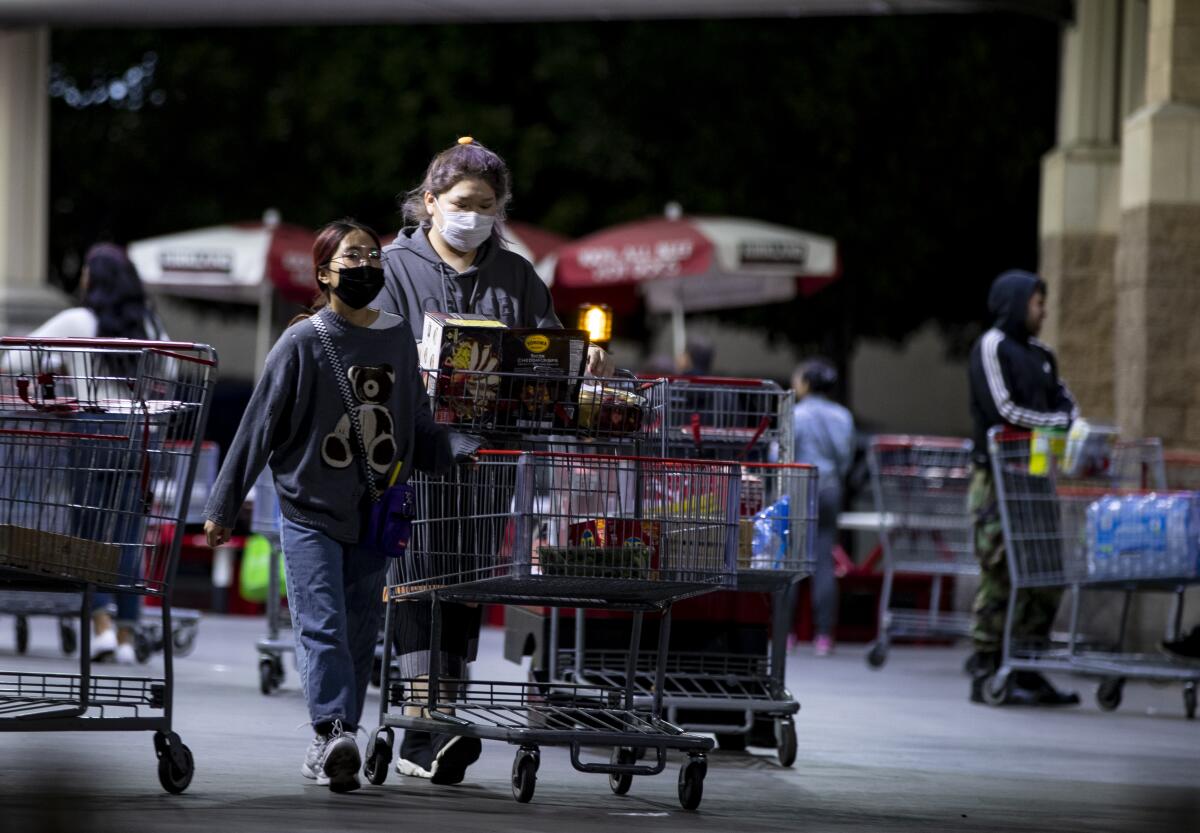
“I’m an extremely germophobic person,” Tuheen said. “I wash my hands 20 times a day, so I haven’t really done anything differently.”
In MacArthur Park, the sidewalks buzzed with the usual energy of vendors hawking smartphone cases and neon sneakers. At the edge of the park, Gina Frankel, who is homeless, sat near her cart of belongings and stared out at the people all around her.
“If somebody is coughing or sneezing around me, I hold my breath and get out of the area,” said Frankel, 64. “There are places here to wash your hands — but it’s hard to do because of this,” she said, displaying her hands, which were cracked from her psoriasis.
Around the block, a man feeding pigeons waved off questions about the virus.
“It’s not that bad in this area,” he said, “so I don’t really worry about it.”
But the virus, which has killed more than 3,500 worldwide, was becoming increasingly hard to contain in California, where officials had started to switch gears, focusing less on containment and more on slowing its spread.
In the Bay Area, health officials issued aggressive recommendations to the public: Stop shaking hands, stockpile medicine, work from home, and if you can’t, stay an arm’s length away from your co-workers. Without decisive action, San Francisco’s director of health warned the public, the death toll would spike.
“We must reduce the times and places where people come together,” Dr. Grant Colfax said Friday. “Human viruses need people to carry them.”
On Saturday in San Francisco, where officials had recently canceled the St. Patrick’s Day Parade, the Grand Princess cruise ship was waiting just offshore.
The night before, a U.S. Coast Guard helicopter had swooped down, dropping off gloves and face masks for the 3,000 people aboard, including 21 who had already tested positive for the virus. When a cutter zipped through the water, ferrying off a passenger who was critically ill from something other than COVID-19, many others on board began to wonder how long it would be until they got off the ship.
A 75-year-old Rocklin resident, who had taken an earlier voyage on the Grand Princess, died from complications of COVID-19 — California’s only confirmed fatality from the virus, which has sickened more than 80 across the state.
In Los Angeles, the city’s marathon was still scheduled for Sunday morning, but officials urged spectators to stay at least six feet away from strangers, because that’s the maximum distance airborne droplets from a cough or sneeze can travel.
Back at the jam-packed Costco Saturday morning, Larchmont resident Jon Oh said that although he had already stocked up on household essentials last week, he was back for a few more things — chicken soup, maybe another carton of water.
“We always try to be prepared,” Oh said. “If something hits, it’s going to happen fast. The situation could go from, ‘Don’t worry about it,’ to the opposite.” If nothing else, Oh said, he could add the stuff to his earthquake stockpile.
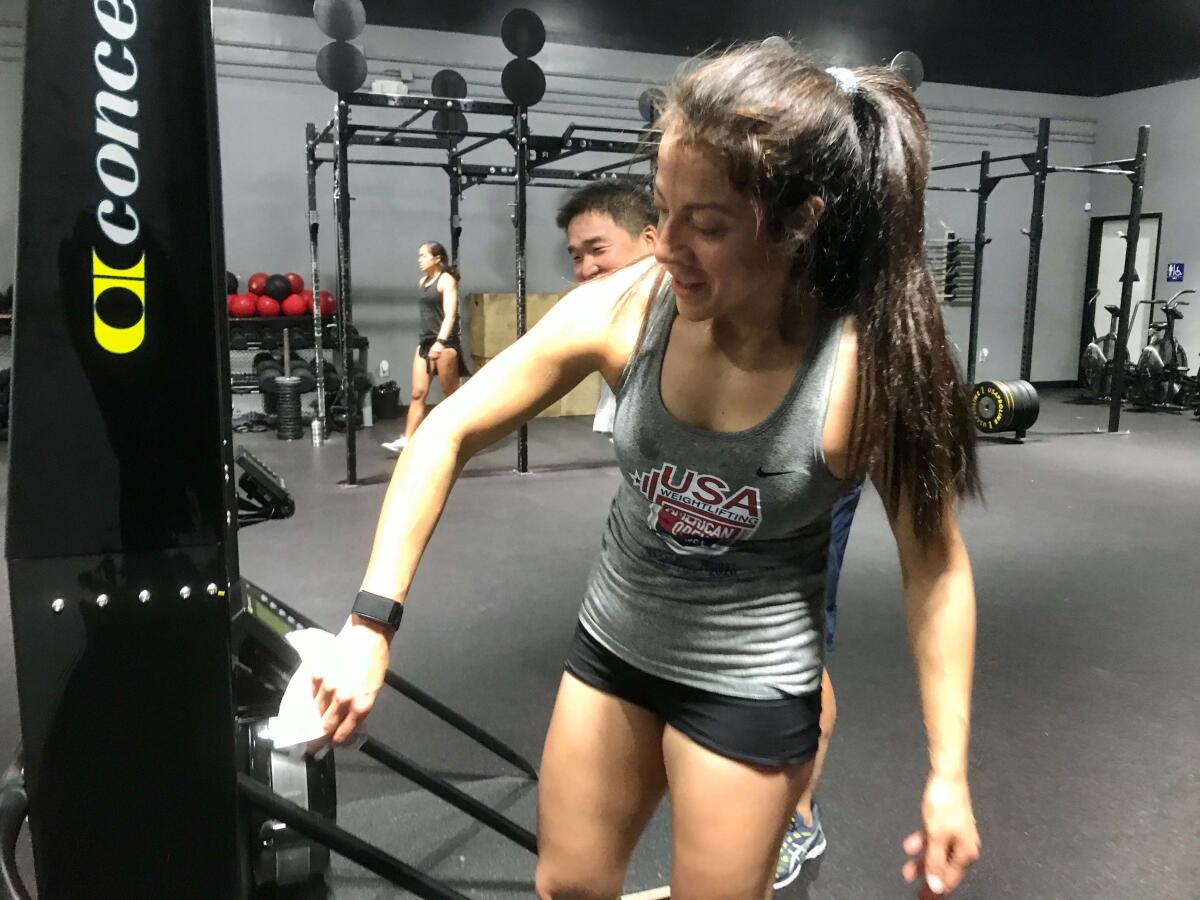
An hour south, at a gym in Tustin called OC FIT Las2winz, people had ditched their method of circuit-training class encouragement — high-fives — opting instead for elbow bumps. And near the entrance, gym co-owner Natalia Guzman, 30, greeted clients with a smile and a reminder.
“Wash your hands,” she said, looking over at the extra gallon of Purell she’d set on the counter. “Use hand sanitizer.”
Normally, Guzman said, her 63-year-old father would be here. He’s always the first person in line for workout class, she said, but because of his kidney transplant he takes a medication that suppresses his immune system. She and her twin sister, another co-owner, didn’t want to take any risks, Guzman said, so they banned him from their gym.
So far, he’s the only regular who isn’t showing up.
Jay Olegario, a nurse who attended a 7:15 a.m. class at the gym, said he uses the same safety precautions here as he does at the hospital. He washes his hands constantly and, like his scrubs, he said he washes his gym clothes as soon as he gets home.
“Nothing will keep me from this place,” he said. “It’s a gamble just being out in general.”
For Michi Kono, who attended the 8:15 a.m. class, the benefits of coming to the gym — lower blood pressure, lower cholesterol and weight loss — still outweigh his fears of catching the virus. Still, the 54-year-old orthopedic surgeon said he had been following news of the virus closely and was taking precautions.
While he still plans to attend church on Sunday, Kono said, he has decided not to take Communion or shake anybody’s hand. He’s healthy and knows he would probably survive the virus, but feels compelled to protect others with weakened immune systems.
“If I did become a carrier and I’m not symptomatic and let’s say my wife gets it and then she visits her 80-year-old parents?” he said. “It becomes an ethical and medical quandary.”
Kono said he believes that the virus will continue to spread in Southern California and that eventually officials here will take steps to limit human contact. If that happens, he said, he’ll heed all warnings — even if that means staying away from the gym.
A few miles away at a Souplantation restaurant, a maroon sign welcomed guests: “Please use hand sanitizer before going down the salad bar. Thank you.”
Most patrons complied, pumping a few squirts into their palms, but the restaurant was two-thirds full and customers didn’t seem too worried.
“It’s going to have to get a lot worse for me to panic,” said Dixie Shedwill, 79, who was recently diagnosed with breast cancer.
Once she starts chemotherapy, she might have to reconsider, Shedwill said, before turning to her 83-year-old boyfriend, Bruce Nameth, and asking what he thought about the coronavirus.
Nameth took a long sip of coffee.
“If you sit around and worry about everything,” he said, “you’ll never do anything.”
More to Read
Sign up for Essential California
The most important California stories and recommendations in your inbox every morning.
You may occasionally receive promotional content from the Los Angeles Times.
